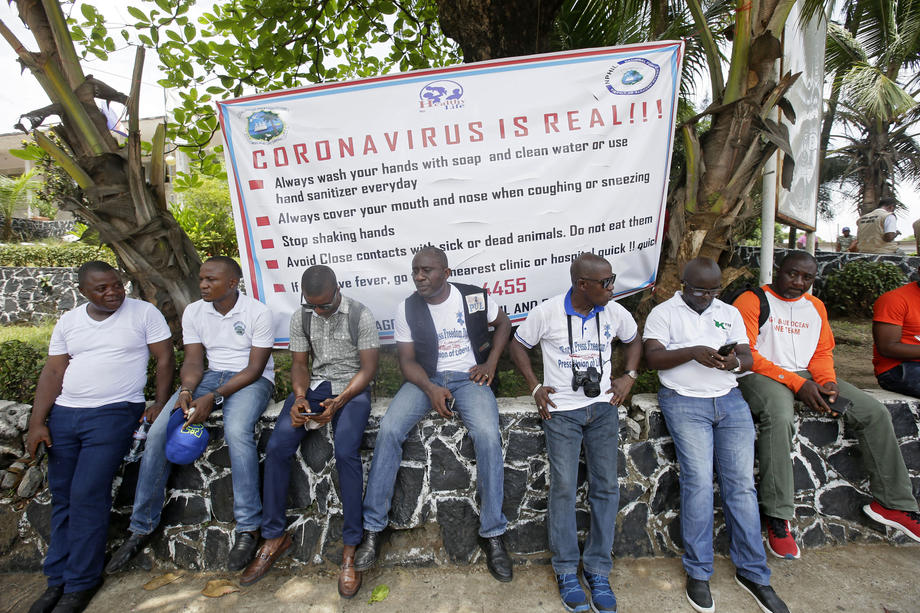With the rapid increase in the number of COVID-19 infections in Africa, governments across the continent quickly imposed lockdowns to prevent the disease’s further spread. In many countries, these measures included blanket bans on movement, while others imposed social distancing.
The tough enforcement of these rules has posed serious challenges for journalists and media outlets in Africa. In several countries, journalists are finding it difficult to report on the cases due to movement restrictions.
Attacks on journalists have steadily mounted, as they have become targets of arrest and physical abuse, in many cases by law enforcement officials. According to data collected by the International Press Institute (IPI), which is monitoring press freedom violations in connection with COVID-19 worldwide, the highest number of physical and verbal attacks on journalists around the world have been reported in Africa. As many as 14 incidents of attacks and nine cases of detention have been recorded on the continent.
Disregard for accreditation cards in Zimbabwe
Zimbabwe currently tops in the list of the number of cases. Local experts say that a key problem in Zimbabwe is that, due to the situation around the pandemic, journalists have not received press accreditation cards for 2020. Police have harassed journalists with outdated cards, even though officials have stated officially that the police should allow journalists with 2019 to work normally during the lockdown. According to Nompilo Simanje, Zimbabwe legal and ICT policy officer for the Media Institute of Southern Africa (MISA) Zimbabwe’s Legal and ICT Policy officer Nompilo Simanje, the lack of press cards and lack of communication among police has led to numerous attacks by the securityforces against journalists, even though journalists and media outlets are classified as essential services during the country’s lockdown.
“The Zimbabwe Media Commission, which is the regulator for media practitioners, has not yet issued the accreditation cards for 2020. Between the time we were notified of the lockdown and now, we have recorded over 15 cases of violations of media freedom, including arrests, threats and harassment of journalists by the police and the army”, Simanje told IPI.
According to Simanje, MISA Zimbabwe issues a letter almost on a daily basis regarding violations against journalists.
MISA Zimbabwe has taken legal steps to ensure that journalists are able to function without any obstruction from the authorities. “We have filed an urgent chamber application with the High Court seeking a declaration that the 2019 accreditation cards are still valid, and a prohibitory interdict prohibiting the police from violating or interfering with the exercise of rights by journalists”, Simanje said.
On April 20, Zimbabwe’s High Court ruled in favor of MISA Zimbabwe, halting the harassment, arrests and detainment of journalist carrying accreditation cards from 2019 by the country’s police force.
In Uganda, too, journalists have faced attacks by security personnel, where a lockdown and a curfew are in effect.
“The majority of these incidences are due to the fact that security personnel were not informed of the journalists’ role in the society and their status as essential services”, Joe Nam, a contributing writer for the Daily Monitor, told IPI.
Financial challenges pose existential threat
While the COVID-19 pandemic has put journalists at risk, it has also created financial uncertainty for media outlets in Africa. In South Africa, media outlets are facing a decline in their advertising revenue
According to Khadija Patel, vice-chair of IPI’s Executive Board and the editor-in-chief of Mail & Guardian, the pandemic has underscored the need for journalism to be protected as a public good and the fact that news media should not be the sole domain of billionaires.
“News media is the property of all of us, as we navigate this extraordinarily difficult time. I hope that we rally to support and protect the structures that underpin democracies, and the media is key in this”, she said.
“The situation in South Africa has changed drastically after the first confirmed case of Covid-19 in mid-March. The main concern is that large parts of the legacy media are still dependent on advertising revenue, which has dried up almost completely. This has affected the publishers’ ability to pay salaries to workers”, Patel said. “The issue is an existential one for many media outlets dependent on the revenue, including Mail & Guardian.”
The country has also not escaped direct attacks on media freedom, but so far, according to Patel, these have been sporadic incidents. “There have been a couple of incidents where the police have turned their guns on journalists. One case was in Johannesburg where a journalist was recording police, who were dispersing a crowd outside of a store in a brutal fashion, and the police threatened the journalist. Thankfully, this is not something that happens very often”, Patel told IPI.
The great economic shock has also affected newspapers in Zimbabwe, where the traditional distribution method of newspapers through newsagents has been put on hold because of the lockdown.
“We have had to completely stop printing physical newspapers and instead have moved our content online for both safety and economic reasons”, the editor of The Standard, Kholwani Nyathi, said in an interview.
In Zambia, the government has cancelled the license of private television network PrimeTV ostensibly over the station’s refusal to carry government ads on COVID-19 free of charge.
“Prime TV was considered very critical of the government and has been accused of being sympathetic of the opposition. It has been said that the cancellation is in relation to the TV station’s coverage of the COVID-19 outbreak. But what I see is a serious assault on press freedom because every media institution has the right to existence”, press freedom advocate and founder of Free Press Initiative Zambia, Joan Chirwa, said
